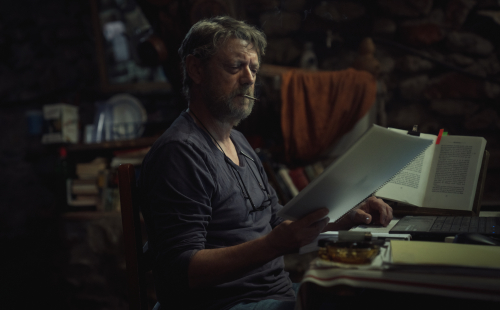
Festival de Cannes
MOVIE REVIEW
Close Your Eyes (2023)
Victor Erice made a stone classic of Spanish cinema with “The Spirit of the Beehive” back in 1973 but in the intervening decades has made only one other feature film and one documentary, until now. After a gap of 31 years “Close Your Eyes” delighted the Cannes Film Festival with the demonstration of a master at work, telling a sad and complicated story with patience and respect, as well as plenty of nuns. The trouble is that this movie has so clearly been fretted and fussed over that it has lost the freshness and spontaneity the best cinema hopes to capture. This sense of being over-rehearsed is perhaps understandable, but unfortunate, as it prevents this good movie from being a truly great one.
Miguel (Manolo Solo) was a good movie director on the cusp of his big break, when the leading man of his second film, Julio (Jose Coronado), disappeared without a trace. Huge searches were undertaken and rewards were offered, but Julio was gone, almost as certainly as if his friendship with Miguel had never existed. The resulting inability of Miguel to finish the film, thanks to a combination of grief and inexperience, killed his directorial career; and he now ekes out a living as a translator, basically off the grid in a caravan in a boatyard in a forgotten coastal town. But Miguel is tracked down by a tabloid-style TV show which is revisiting Julio’s case; and the show offers to buy his footage from the lost film as well as pay for him to be interviewed. This is a no-brainer; and it’s not just that Miguel needs the money. The chance to be interviewed by TV journalist Marta (Helena Miquel) means the attention might help Julio’s daughter Ana (Ana Torrent, yes, the little girl from “The Spirit of the Beehive”) get some closure at last.
Well. The television show does its work; and Miguel is contacted by a social worker named Belen (Maria Leon) from a remote care home operated by cheerful nuns. She tells Miguel something which should not be spoiled; and Miguel could no more pass up the opportunity to investigate than he could stop breathing. Suffice to say that what transpires is, among other things, an examination of personal priorities and how kindness really is the only thing that matters.
The trouble is Mr. Erice lets all this unfold over a leisurely two hours and 49 minutes, with plenty of space for little moments, such as Miguel’s friendship with the other boatyard residents and the daily routines of the care home, down to discussions of the soup of the day. It’s an attempt to demonstrate that rejecting fame and wealth can offer equally valuable alternatives, but this conflation of anti-capitalism with self-respect ignores the life Ana had without a father. It also glosses over the modern reality of life with smartphones, on purpose. Miguel’s main friend is Max (Mario Pardo), his former cinematographer who keeps a deliberately analogue home and who has a few good, short speeches about the importance of film instead of digital art.
It’s disappointing that Mr. Erice and his cowriter, Michel Gaztambide, didn’t challenge themselves to address how hard it is to vanish in today’s interconnected world. This is despite the movie-within-a-movie being about an old man in France being determined before he dies to find the daughter he lost during the war in Hong Kong. But Mr. Erice is aiming for a new “Cinema Paradiso,” which is to say, an ending which celebrates the power of film to connect people and the importance of physical things in our personal history. This gives an important part to Venecia Franco, who makes a very big impact just by showing up (in her professional debut), just as Mr. Erice intended.
This is a movie about how people can be haunted by absences more palpably than other people’s presence, and how relationships can alter, or not, over the bends of time – a fine metaphor for Mr. Erice’s career. A better movie would have been snappier, more modern, but there’s value in something this well made and intricate. Let’s just hope we don’t have to wait another 30 years for his next movie.
Comments